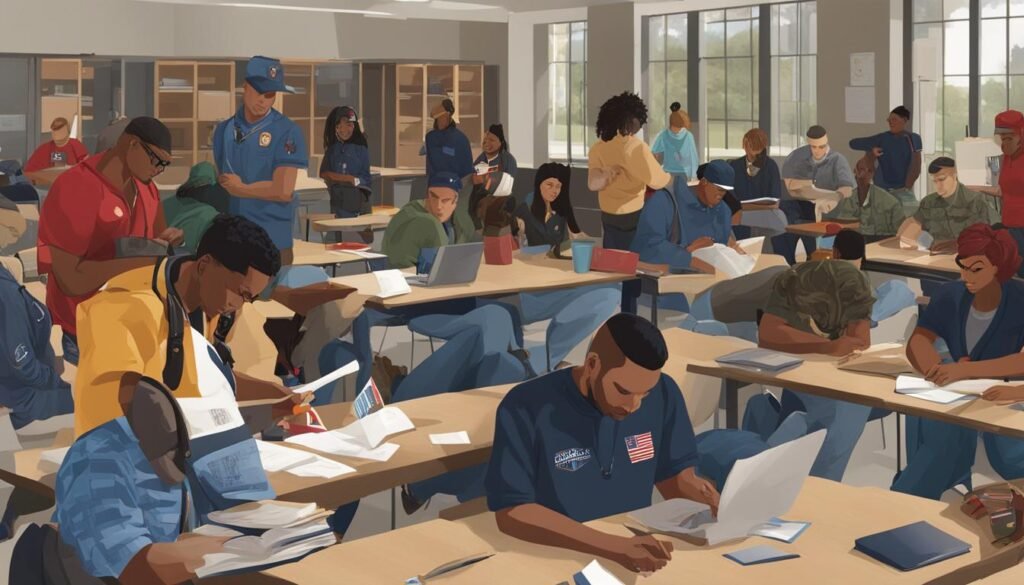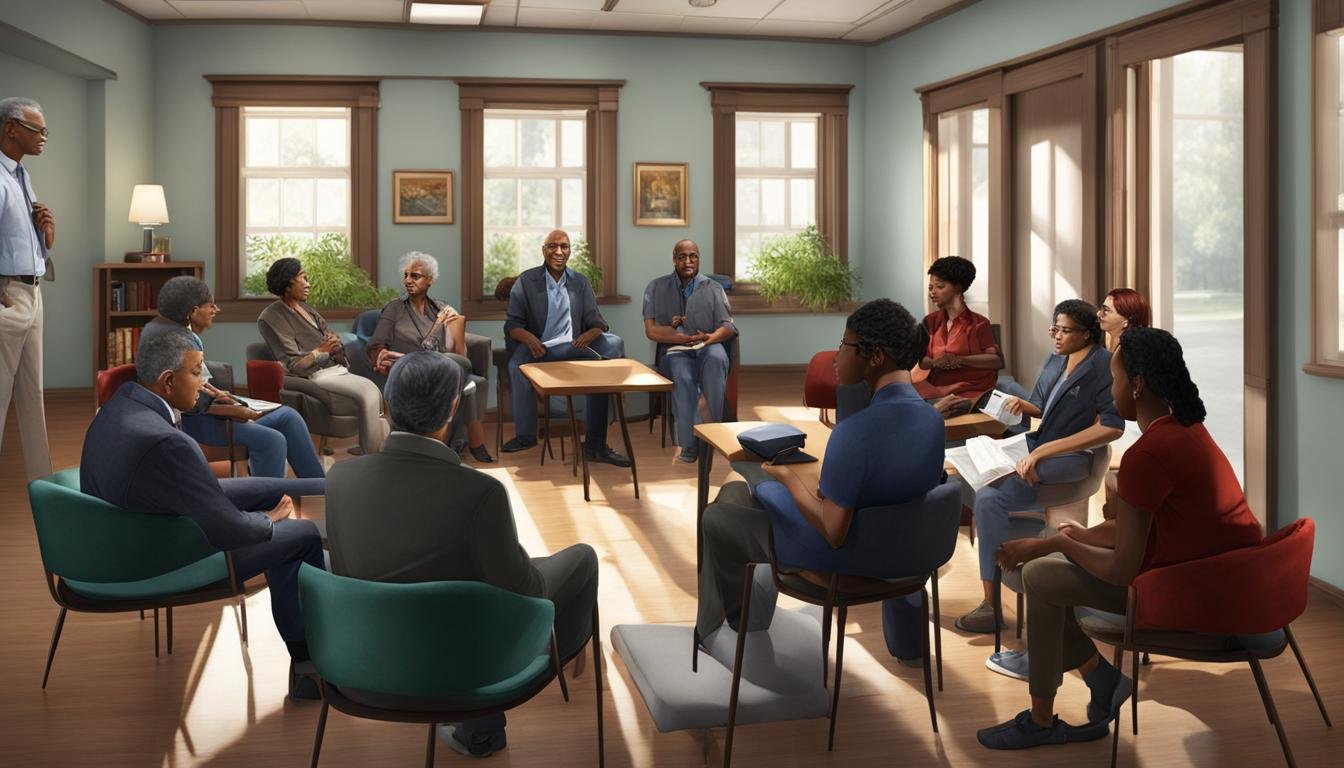Many college educators and student affairs administrators are implementing strategies to support and enhance the academic success of student veterans. These strategies aim to ease the transition of veterans into college and provide them with the necessary support throughout their higher education journey. Student veterans often bring unique strengths and experiences to the campus, including leadership skills and self-discipline. However, they may also face challenges such as being first-generation college students, holding off-campus jobs, and managing financial and time constraints. It is important for colleges to create a vet-friendly campus environment that offers support, programs, and resources to address the specific needs of student veterans throughout their entire student lifecycle.
Key Takeaways:
- Effective support networks are crucial for the academic success of veteran college students.
- Colleges must create a vet-friendly campus environment to address the unique needs of student veterans.
- Strategies like mentorship programs, campus events, and priority registration can enhance the support provided.
- Mental health support is critical for student veterans, and colleges should offer culturally competent services.
- By prioritizing the well-being and success of student veterans, colleges can foster a vibrant and supportive veteran community on campus.
Strategies to Support Student Veterans

Colleges can implement various strategies to better support student veterans on campus. By amplifying awareness of resources and providing guidance and information about financial aid, off-campus housing, training programs, and education benefits, colleges can ensure that student veterans have the necessary information to navigate college life successfully. Streamlining services is another effective strategy, ensuring that student veterans can easily access the physical or emotional support they may need.
Staff and faculty trainings on effectively communicating with and supporting military and veteran students are crucial. These trainings equip educators with the knowledge and skills to understand the unique challenges and experiences faced by student veterans. Additionally, colleges can develop transition courses specifically designed for student veterans, helping them adjust to college life and providing them with the necessary skills and resources to thrive academically.
Peer mentorship programs and campus events play a vital role in fostering a sense of belonging and community for student veterans. By connecting them with fellow student veterans who have successfully navigated college life, these programs provide valuable support networks and networking opportunities. Establishing a vet resource center on campus can further enhance support for student veterans, offering a dedicated space where they can access resources, seek assistance, and connect with other military-affiliated student organizations.
Table: Examples of Strategies to Support Student Veterans
| Strategy | Description |
|---|---|
| Amplifying Awareness of Resources | Guidance and information about financial aid, off-campus housing, training programs, and education benefits. |
| Streamlining Services | Ensuring easy access to physical or emotional support for student veterans. |
| Staff and Faculty Trainings | Effective communication and support for military and veteran students. |
| Transition Courses | Courses designed to help student veterans adjust to college life and succeed academically. |
| Peer Mentorship Programs | Connecting student veterans with fellow veterans for support and networking. |
| Vet Resource Center | A dedicated space for student veterans to access resources and connect with other military-affiliated student organizations. |
Mental Health Support for Student Veterans

Student veterans face unique challenges when it comes to accessing mental health support. Stigmas surrounding military mental health can make it difficult for veterans to seek help, while the available resources may not always cater to their specific needs. However, there are avenues for mental health support that can be beneficial for student veterans.
Student veterans can access mental health resources through organizations like the Department of Veterans Affairs and on-campus support offices. These resources often offer individual and group counseling, support group meetings, and emergency response services. By providing a safe and confidential environment, these services aim to address the mental health concerns faced by student veterans and help them navigate the transition from military to civilian life.
In addition to professional resources, student veterans can also benefit from self-help tools that focus on the unique challenges they face. Books and podcasts that provide guidance on communication, support networks, and transitioning can offer valuable insights and strategies for managing mental health. These self-help resources, coupled with professional support, can serve as a comprehensive approach to addressing the mental health needs of student veterans.
The Importance of Culturally Competent Support
Student veterans have distinct experiences and backgrounds that require culturally competent mental health support. Understanding the unique challenges they face and tailoring support services accordingly is crucial. Culturally competent care takes into consideration the military culture, experiences of deployment, and the challenges of reintegrating into civilian life. By recognizing and addressing these specific needs, mental health support can be more effective and student veterans can feel understood and supported.
Creating a Veteran Community on Campus
Support networks and resources for student veterans not only contribute to their mental well-being but also foster a sense of community on campus. When student veterans feel that their needs are met and that there is a community that understands and supports them, they are more likely to thrive academically and socially. Creating a veteran community on campus involves providing academic support, programming, and opportunities for veteran students to connect with one another. These initiatives can help student veterans feel a sense of belonging and enhance their overall college experience.
How Can Support Networks Benefit Veteran College Students?
Veteran student support groups provide a crucial network for college students transitioning from military to civilian life. These groups offer mentorship, academic guidance, and a sense of community, which are essential for the well-being and success of veteran students in navigating the challenges of higher education.
Conclusion
Support networks are essential for veteran college students, as they play a crucial role in easing the transition and improving academic success in higher education. By implementing strategies to support student veterans, colleges can create an inclusive and welcoming environment that addresses the specific needs of this population.
One of the key aspects of supporting student veterans is amplifying awareness of the available resources. Providing guidance and information about veteran student services, such as financial aid, off-campus housing, training programs, and education benefits, can immensely help them navigate their college journey.
In addition, it is crucial for colleges to prioritize mental health support for student veterans. By offering accessible and culturally competent mental health resources, both on and off campus, colleges can ensure that veterans receive the care they need. This includes individual and group counseling, support group meetings, and emergency response services.
Lastly, fostering a sense of belonging and creating a vibrant veteran community on campus is essential. Peer mentorship programs, campus events, and a vet resource center can provide networking opportunities and a supportive environment for student veterans. Additionally, offering priority registration for classes can further enhance their academic success.
In conclusion, by prioritizing the well-being and success of student veterans, colleges can create a thriving veteran community on campus. By implementing strategies, amplifying awareness of resources, providing mental health support, and fostering a sense of belonging, colleges can ensure that veteran students receive the support they need to thrive in their academic journey.



